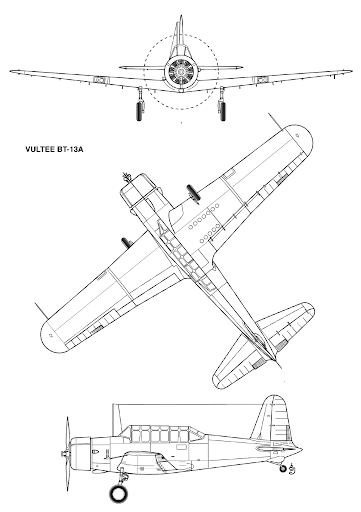The Valiant was the basic trainer used by American pilots during the Second World War.
The BT-13 aircraft were basic trainers used by the United States (US) Army Air Forces during World War II. As the second of the three-phase training plan for pilots, these aircraft required the student pilot to use a two-way radio communication with the ground and to operate landing flaps as well as a two-position, variable pitch propeller. These aircraft were much faster and more complex than the other trainers used at the time.

Serial Number: 42-90406
Manufacturer: Vultee Aircraft Corporation
Crew: Two (Instructor and student)
Engines: One Pratt & Whitney R-985-AN-1 Wasp Jr. 9-cylinder radial; 450 horsepower
Wingspan: 42 feet 2 inches
Length: 28 feet 8 1/2 inches
Height: 12 feet 4 3/8 inches
Weight: 3,345 pounds (empty); 4,360 pounds (loaded) (maximum)
Speed: 140 mph at 5,500 feet (cruising); 166 mph at 1,400 feet (maximum)
Range: 516 miles
Service Ceiling: 16,500 feet
Armament: None
Cost: $23,068 (average BT-13 cost of unit as of 1942)
During World War II, Hill Air Force Base maintained and overhauled the engine used in the BT-13 trainers. As the most widely used training aircraft during World War II, the Valiant was vital to getting our airmen trained and prepared to take to the skies. Over the course of its lifetime, over 9,000 Valiant’s were built.
The BT-13 on display was disposed of as surplus just a month after its assembly in 1944. In 1992, this aircraft was fully restored and acquired by Hill Aerospace Museum for display.
The Valiant was the basic trainer used by American pilots during the Second World War.
In 1939, the BT-13 cost $20,000 per aircraft.
A total of 9,525 were built by Vultee Aircraft.
The Valiant had a top speed of 180 mph.